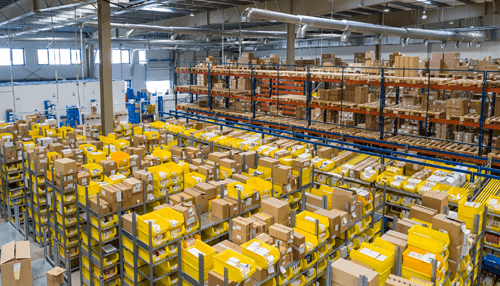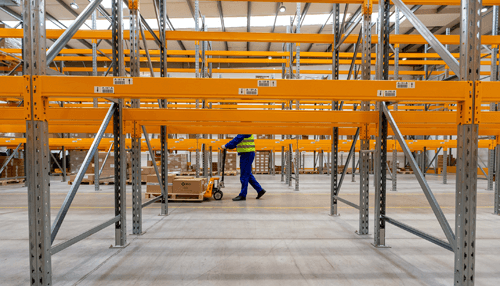With the increase in goods and information in the market, the need for warehouse facilities and avenues of distribution is ever so paramount. Warehouse facilities aim to handle and store goods in a planned space that will enable businesses to distribute them effectively to their intended destination. The warehousing facilities offer a smooth and easy transition for distribution when the goods are needed.
Most goods found in warehouses are usually for sale and are distributed to their intended customers who had previously ordered the items through online shopping or catalogues.
Therefore, the warehouses are normally broken down into different sections for different categories of goods.
The distribution services attend the warehouses and seek out the order for delivery to the consumer. Therefore, distribution centers are merely supply chains that enable goods to be delivered daily. Therefore, goods have a shorter lifespan in the distribution center than in the warehouse. This chain from warehouse facilities and distribution services should be seamless to fulfill the customer’s order request.
Some warehouse facilities like Worldwide Logistics have their distribution services which offer all the processes from storage, handling, transport, docking, and delivery to the customer.
However, other warehouses outsource the distribution services to other firms to ease up the load and increase productivity and efficiency.
Types of warehousing facilities
There are various types of warehousing facilities in the market:
Public warehouses
These offer storage facilities to the public at a fee. These warehouses require licensing and certification from the government and are private or business-owned.
Public warehouses offer businesses relief as they can access storage without having to invest heavily to maintain and run a warehouse since buying a warehouse can be costly.
Therefore, they can access storage services at low costs and offer security for the goods. Public warehouses have facilities for the movement, loading, and unloading of goods, and their proximity to transportation modes such as airports, railways, and docks make it affordable for businesses to transport goods in a timely fashion.
Private warehouses
These are owned by big manufacturers who use the warehouses for their personal storage needs. As a result, the public cannot access or use the facilities in the warehouse. Private warehouses are normally for big manufacturers who are capable of maintaining and constructing their storage facilities, and those who need a lot of storage capacity for their goods.
Bonded warehouses
These warehouses offer storage for imported goods that are waiting for the customs duty to be paid. These warehouses are operated by customs duty officials or the government and hold the goods in the warehouses until the owner of the goods completes payment of the duty. The owner can give partial payments and get some goods released slowly as they complete the full payment.
Functions of warehouse facilities
Warehouses not only offer storage for goods intended for sale but also serve the following functions:
Control of inventory
Warehouse facilities offer the option of controlling the inventory of the products, preventing errors, and knowing the exact number and location of goods in the place. Big businesses ship in a lot of goods, and therefore it can be tedious and strenuous to always confirm the location and number of the goods in the warehouse.
With an inventory list, there is sure labelling, pricing, and analysis of the products, which makes it easier for the employees to retrieve the intended product without confusing it with another one. The overall pricing of items is also normally determined in warehousing facilities, as they gauge the availability of the goods depending on the demand in the market.
Warehouse contracting
Several businesses may lack the necessities and funds to set up their warehouses from the ground up, or even to set up their distribution centers. Warehouse facilities come in by offering to contract the business set up in the location and establish distribution patterns that aim to beat customer delivery time and infiltrate the competitor market.
Transportation
Some warehousing facilities offer transportation services to their clients, especially if they handle customers directly without having to outsource to distribution facilities. The transport is done by rail, air or road. The warehouse facility provides the client with a chance to track the shipment of the goods from the warehouse directly to their doorstep.
Transloading
Various goods may require two or more transportation modes. Therefore, transloading is the transfer of goods from one transport mode to another. Warehouse facilities offer this specification for their clients, making work easier.
Risk aversion
The risk factor for goods stored in spare rooms or basements is more than that of goods stored in warehouses. There is accountability and security in a warehouse which has tracking managers and security details in all corners, and goods found in the warehouses are usually insured against theft or burglary. Therefore, any misplacement of goods can be easily traced and identified without being a liability to the owner.
Benefits of warehousing facilities and distribution centers
Warehousing facilities aim to provide a space for storage for a large number of goods and products for eventual sale to the consumer. The ever-widening gap of goods from production to consumption is a constant worry for manufacturers. Therefore, they often have to downscale their production process and wait until the goods are in demand.
Warehousing facilities offer relief to manufacturers as they hold the items required for seasonal use until they are needed, making it possible for an all-around production supply of items that are later taken to storage. Perishable goods, however, have a faster expiration date and therefore require faster transportation and delivery.
Warehouses can also serve as packing and grading sites for goods that are shipped in batches. There are facilities available for packing, sorting, and packaging the goods on-site, lessening the shipping fee for bulky items.
Business owners are reliant on warehouses for financing purposes. For instance, a business owner in need of financing can provide their goods in warehouses as leverage or security and get money for operations. This gives the business owners an opportunity for financing and further business transactions.




